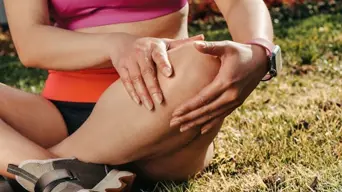Exercise or not, why do my knees hurt?
We find out from a physiotherapist why people are so prone to knee pain and what to do about it.

Knee pain. Pexels/Kindel Media
702's Gugs Mhlungu is joined by Lesley Meyer, a physiotherapist and lecturer at the University of Pretoria.
So many people complain about knee pain - from runners to casual walkers to those who've just stood up too quickly.
Gugs Mhlungu chats to physiotherapist Lesley Meyer to get advice on how to keep these sensitive, hard-working joints of ours healthy.
Meyer confirms that problem knees surface with all types of people.
"You'd be surprised at how many people come to me for knee pain and it's irrelevant of the age or what they are doing."
Lesley Meyer, Physiotherapist
"They can be top marathon runners or young teenagers going through that growth spurt, they can be people that are sedentary sitting behind their desk all day or even older generations where they've had knee surgery. They all say to me, why am I getting knee pain and why isn't it going away."
Lesley Meyer, Physiotherapist
Our knees love to move, Meyer says, but it's got to be the right kind of movement.
And, keep in mind that our knees don't work in isolation.
"You've got to get the right alignment, you've got to have the right strength and mobility, and then you get the support from the surrounding muscles. But it's not just the knees - you've also got to look at the hips and the ankles."
Lesley Meyer, Physiotherapist
She points out that if you have an old ankle injury or shin splints, or just bum pain from walking on the beach, those can all impact your knees.
"You must strengthen your bum, you must strengthen your quads, you must make sure your hamstrings are loose enough, you must make sure your calves are loose enough - they all work together."
Lesley Meyer, Physiotherapist
Meyer teaches her patients very simple daily routines that keep the knees healthy.
These include stretching the glutes and the quads, and avoiding locking your knees when youre standing.
For people who have foot issues, shock absorbing shoes or inner soles can be a huge help.
She also emphasizes the importance of doing warmups before exercising, and staying hydrated.
It's useful to go to a physio because once the source of your knee problem is identified, the practitioner can then target that specific problem.
Listen to Meyer's detailed advice in the interview audio at the top of the article